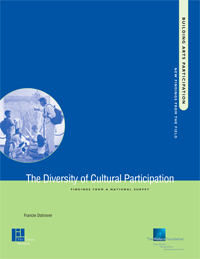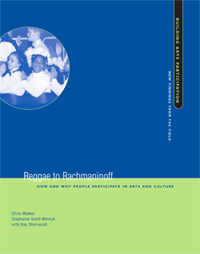Arts Research
2010, 48 pages, The Urban Institute, 2100 M Street NW, Washington, D.C., 20037, (202) 833-7200 http://www.urban.org
Download:
![]() The Diversity of Cultural Participation: Findings from a National Survey (299Kb)
The Diversity of Cultural Participation: Findings from a National Survey (299Kb)
Repeatedly whipsawed by state budget emergencies, and by swings in the public's perception of what art is and how government ought to support it, state arts agencies are developing innovative ways to refocus their efforts from supporting arts providers through grant-giving to the larger public benefits of their work. Tiny agencies often overlooked among the welter of much larger line items in state budgets, they nonetheless have considerable impact in determining the destinies of arts providers, and the different constituencies they serve.
Read More...We may go to the opera, live theater, or the symphony, but we don't stop to really think about how much these performances can mean to our daily lives and to our communities. Those performing arts organizations have been concentrating on this issue for years.
Read More...2010, 72 pages, The Urban Institute, 2100 M Street NW, Washington, D.C., 20037, (202) 833-7200 http://www.urban.org
Download:
![]() Reggae to Rachmaninoff (397Kb)
Reggae to Rachmaninoff (397Kb)
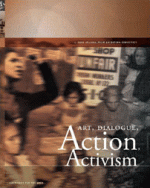
Art, Dialogue, Action, Activism examines the role of dialogue in the work of cultural organizations oriented toward civic action and activism. Four very different efforts provide insights into dialogue integrated within cultural activity, dialogue as a means to explore different perspectives within a commonly held goal or position, and dialogue as a necessary precursor to decision making or action.
Read More...Arts Wisconsin, the Wisconsin Arts Board, and Americans for the Arts are happy to announce the republication of the landmark 1969 book, The Arts in the Small Community, by Maryo Gard Ewell and Michael F. Warlum. The new guide stays true to its original roots and mission set forth by Wisconsin's community arts pioneer Robert Gard, but has been thoroughly updated to address contemporary examples in the realm of community arts.
Read More...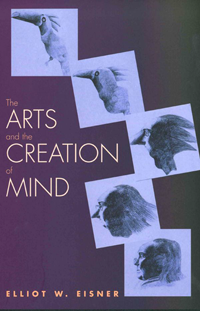
Elliott Eisner argues that the arts are more important means for developing complex and subtle aspects of the mind to deal with the ambiguities and uncertainties of daily life than are the formally structured curricula. He provides a fresh and admittedly iconoclastic perspective on what the arts can contribute to education, namely a new vision of both its aims and its means.
Read More...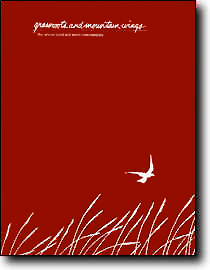
This timeless resource helps identify and define the philosophical foundations and practice principles of community arts development. It captures and shares the creative and pioneering efforts that drive the movement and provides insight and expertise for people working in rural and small communities.
135pp, paperback (1992, Center for Community and Cultural Studies, Columbia College)
Read More...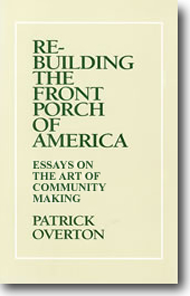
This book takes a fresh and positive approach to understanding the arts as essential for creating authentic and sustained community. While it focuses on development in rural and small communities, it is an inspiration for individuals and organizations large and small.
160pp, paperback (1997, PrairieSea Press)
Read More...Foundations think they're doing the right thing by requiring grantees to form partnerships with each other. There are, however, two sides to every story, and grantees share their stories of frustration here.
Free online from the Stanford Social Innovation Review.
Download:
Read More...
